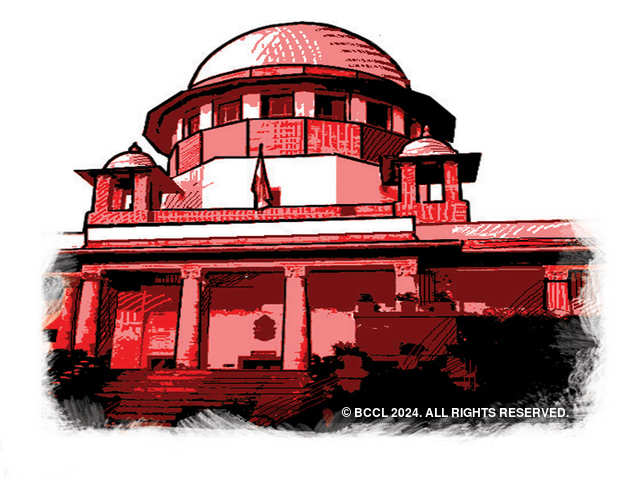Supreme Court bench to examine personal laws clashing with gender justice
Supreme Court bench to examine personal laws clashing with gender justice
SAMANWAYA RAUTRAYET Bureau | Jan 8, 2020, 06.42 AM IST

NEW DELHI: Beginning January 13, a nine-judge bench of the Supreme Court will examine a host of petitions challenging the validity of several practices across religions which are in conflict with gender justice in modern India.
The bench, led by CJI SA Bobde, is expected to junk the traditional essentiality doctrine which has in recent years tied the court in knots in cases with a religious connotation.
The constitutional courts have traditionally examined if a practice was essential to a religion and whether it could be protected as a practice of a separate sect. This has landed the courts in trouble as it warrants an enquiry into theological aspects of religions.
READ 2 MORE STORIES
The top court has been wanting to junk this essentiality test for years now and instead switch to a more practical method which would involve assuming that every practice was essential to a religion but test it against the values mandated by the Constitution and see if they were still valid.
The bench’s verdict will not only impact a review filed in the Sabarimala case against a top court ruling permitting women of all ages to enter the Lord Ayappa temple in Kerala, but also others such as the entry of women into mosques, female genital mutilation among Dawoodi Vohras and allowing women into fire temples among the Parsis.
The bench will include Justices R Banumathi, Ashok Bhushan, L Nageswar Rao, Mohan M Shantanagoudar, S Abdul Nazeer, R Subhash Reddy, BR Gavai and Surya Kant.
The judges who were part of the earlier Sabarimala bench Justices RF Nariman, DY Chandrachud and Indu Malhotra, will not be part of it.
Former CJI Ranjan Gogoi had referred all these broad issues to a larger bench while dealing with multiple reviews filed in the Sabarimala case. The reference will be crucial as it would impact the manner in which the state is required to ensure gender justice across religions.
PEOPLE’S OPINION
SHARE THIS ARTICLE
READ MORE ON
Related News
- Justice Ranjan Gogoi retires as CJI
- Ranjan Gogoi to get Z plus security in Assam after his retirement
- Chief Justice of India Ranjan Gogoi sits in bench for last time
- Don’t want to get into contentious issue: CJI Ranjan Gogoi
- CJI Ranjan Gogoi: The man who settled India’s longest-running dispute
Most Read News
- Iran claims 80 Americans killed in missile strike: Here is all you should know about the attack
- Donald Trump asserts Iran is ‘standing down,’ vows to continue pressure
- Worst economy in 42 years needs an honest look
- Bharat Bandh: Banking, transport services may be hit due to strike today
- View: EPF-linked financing, combined with a community land trust model, can complement ‘housing for all’
Recommended News
- No oversight, poor record-keeping led to Kota deaths
- CBI searches residence of accused in Rs 1,038 cr black money remittance case
- Rakesh Asthana case: HC asks CBI Director to be present in court on Feb 10 if probe not complete
- JNU violence: ABVP says ready for probe under SC supervision
More From Our Partners
- ‘Less Risk, Better Profits’: Know how
- 5 cigarettes a day would cost you more than Rs 1 crore by the time you hit 60
Business NewsNewsPolitics and Nation
Hot on Web
- Sensex Today
- Gold Price
- Budget
- New Year 2020
- Mutual Fund Screener
- IPO Allotment Status
- RBI Policy
- Stock market crash
- GST
- Rupee
- Aadhaar Card
- RBI
- How to save Income Tax
- Currency Converter
- Income Tax Calculator
In Case you missed it
- UAE Multi Entry Visa
- Bharat Bandh 2020
- Budget
- When is Budget 2020
- Delhi Election Date
- Iran Missile Attack
- Iran Plane Crash Today
- Donald Trump on Iran Attack
- Personal Finance
- Iran Missile Strike Death Count
- Mutual Fund Schemes
- Retirement corpus
- Mutual Funds
- Investment
- Jio WiFi calling
Trending Now
- Deepika Padukone
- Breaking news
- Bharat Bandh
- Jio WiFi calling
- Budget
- GDP
- Delhi Election
- Indian Economy
- Latest News
- Budget Date
- Mutual Fund Screener
- FD Rates
- Bill Gates
More from our network
- इकनॉमिक टाइम्स
- ઈકોનોમિક ટાઈમ્સ
- Pune Mirror
- Bangalore Mirror
- Ahmedabad Mirror
- ItsMyAscent
- Education Times
- Brand Capital
- Mumbai Mirror
- Times Now
- Indiatimes
- महाराष्ट्र टाइम्स
- ವಿಜಯ ಕರ್ನಾಟಕ
- Go Green
- AdAge India
- Eisamay
- IGN India
- Samay
- Times of India
- Samayam Tamil
- Samayam Telugu
- Miss Kyra
- Bombay Times
- Filmipop
- Games App
- MX Player
DOWNLOAD ET APP
FOLLOW US ON
BECOME A MEMBERTerms of Use & Grievance Redressal PolicyPrivacy Policy|FeedbackCopyright © 2019 Bennett Coleman & Co. All rights reserved. Powered by Indiatimes.
